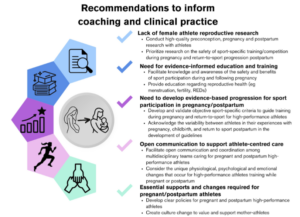Authors: Margie H Davenport, Lauren Ray, Autumn Nesdoly, Jane S Thornton, Rshmi Khurana, Tara-Leigh McHugh.
The recent outstanding performances of numerous trailblazing athlete-mothers are challenging societal notions of who can successfully compete as an elite athlete. Bobsledder Elana Meyers Taylor, biathlete Anaïs Chevalier-Bouchet and luger Natalie Geisenberger all medalled at the 2022 Beijing Olympics. Within the published literature athletes have described how they experience numerous barriers, and are provided with minimal support and guidance, during and following pregnancy. The experiences of coaches, physiotherapists and physicians who work with these athletes have been overlooked in research, but are necessary to develop policy and practice within this area.
Why is this study important?
Research has highlighted a disconnect between the support and guidance that pregnant and postpartum elite athletes want (and need) from their coaches and healthcare providers (HCPs), and what they receive. While elite athletes have provided insight into the ways in which coaches and HCPs can support their success during pregnancy and postpartum, it is critical that coaches and HCPs be provided an opportunity to share their professional perspectives. As such, the purpose of this qualitative study was to describe coaches’ and HCPs’ experiences of working with pregnant and postpartum elite athletes, and to identify actionable steps for research, policy and culture change to support elite athlete-mothers.
How did the study go about this?
We recruited 16 participants who had worked with pregnant and/or postpartum elite athletes within the last five years. They included five coaches or trainers, three physicians and eight physical therapists. Their athletes competed in a range of winter and summer sports – individual and team – including (but not limited to) weight-bearing and non-weight-bearing sprint and endurance, technical, ball-game, and power sports. Participants engaged in one hour zoom interviews where they were asked questions about their experiences working with pregnant or postpartum elite athletes, and what information (e.g., training practices, sport policies or regulations) would allow them to better support their athletes during pregnancy, or during return-to-sport following childbirth. All interviews were transcribed word for word, anonymized, and analyzed to determine key findings.
What did the study find?
The findings of this research are represented by five main themes: (a) lack of female athlete reproductive research, (b) need for evidence-informed education and training, (c) need to develop evidence-based progression for sport participation in pregnancy and postpartum, (d) open communication to support athlete-centred care and (e) essential supports and changes required for pregnant/postpartum athletes (see Figure 1).
What are the key take-home points?
Coaches and HCPs identified the need for policy and practice changes that support athletes through the perinatal period. Research supporting the development of objective measures to guide return-to-sport are critically needed. Coaches and HCPs emphasized the need to educate both themselves and their athletes on menstruation, fertility, relative energy deficiency in sport, as well as the safety and benefits of sport participation during and following pregnancy.
Conclusion
As the number of athlete-mothers in elite sport grow, developing evidence-based guidelines and policies that support the ability of coaches and HCPS to support these athletes is essential. Participants voiced the urgent need for research, education, training and policies that would facilitate an environment that values and supports elite-athlete mothers.
